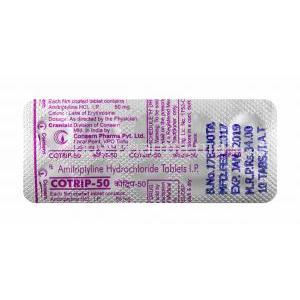Amitriptyline
Uses
How it Works
Common Side effects
Patients who take Cotrip may suffer from such side effects;
Drowsiness,
Strange taste,
Breast enlargement,
Sleepiness,
Blurred vision,
Increased heart rate,
Dry mouth,
Constipation,
Weight gain,
Difficulty in urination,
Orthostatic hypotension,
Blurring of eyesight,
Concentration problems
How it Works
Amitriptyline works in your body by helping regulate natural chemicals in the brain (neurotransmitters) that become imbalanced when people with depression or other mood disorders. Not only does this improve how you feel physically, but it may also reduce sleep needs as well.
Cotrip is a tricyclic antidepressant (TCA), meaning it works in the brain by amplifying and prolonging serotonin and norepinephrine's effects. This medication is commonly prescribed to treat depression, anxiety, as well as mood disorders like post-traumatic stress disorder.
It may also be used to treat pain, peripheral neuropathy (nerve pain), and eating disorders (bulimia). Furthermore, this medication could possibly prevent migraine headaches.
Introduction
Cotrip (Amitriptyline) is a prescription medication commonly used to treat depression, anxiety and other mood disorders. In this product content we will provide detailed information about Cotrip, including its mechanism of action, how it should be taken, potential side effects and precautions when taking this medication.
Maintaining regular dosage of this medicine is necessary for it to work effectively. It may take up to 2-4 weeks before you feel its full effects.
Dosage and administration
The medication should be taken orally, usually 1 to 4 times daily or as directed by your doctor. As it doesn't cause stomach upset, you can take it with or without food.
Your doctor may begin you on a low dose of amitriptyline to assess how you respond before increasing the dosage. Your dosage will depend on factors such as age, weight and any existing health conditions.
Contraindication
You should not take this medication if you have an abnormal heart rhythm or a history of heart disease. Additionally, be sure to inform your doctor if you've ever had seizures or serious psychiatric illness. Furthermore, it's not advised for use by breastfeeding mothers as it can pass into breast milk and harm your unborn child.
Other medications can interact with this drug. Therefore, it's essential to share a list of all your medications with your doctor and pharmacist.
Drug interactions can occur between prescription and over-the-counter drugs, herbal products, and dietary supplements. Drug interactions may alter how your medications work or increase the potential risk for side effects.
Some medications that may interact with Cotrip include barbiturates, guanethidine, reserpine, betanidine, clonidine and methyldopa. These may alter how Cotrip works and increase your risk for serious side effects.
Other medications that can increase the concentration of Cotrip in your bloodstream include certain antifungals and opioid pain relievers. These drugs may lead to low blood pressure, dizziness, fast or irregular heartbeat, drowsiness and other serious side effects such as hypotension.
Careful administration
Amitriptyline is prescribed to treat depression, a mental/mood disorder. It also relieves anxiety and tension, promotes better sleep patterns, and boosts energy levels. This medication belongs to the tricyclic antidepressant class of medications.
It works by altering the balance of neurotransmitters in your brain (neurochemicals). These are naturally occurring chemicals that impact mood and feelings of wellbeing.
This medication is available in tablet or liquid form and should be taken by mouth. It has been prescribed to help treat mental/mood disorders like depression, anxiety, tension, sleep issues and neuropathic pain.
Cotrip can be taken with or without food, depending on your doctor's advice. For optimal effectiveness, take it at the same time(s) each day so that your body gets used to taking it regularly.
Each person should take this medication at a different dose. Therefore, you should carefully read through your medication guide to make sure you take the correct amount.
To prevent an overdose, follow your doctor's instructions when taking medications. Do not increase or discontinue use suddenly.
If you miss a dose of this medicine, take it as soon as possible. However, if the time for your next scheduled dose is close to coming up, skip the missed one and continue with your regular dosing schedule.
Amitriptyline can interact with other medications, potentially leading to serious side effects or making them less effective.
When taking this medication, be sure to inform your doctor of any other medications you are taking. Do not mix this medication with medications used for high blood pressure, heart disease or psychiatric disorders; furthermore, taking it along with drugs used for cancer pain management could result in serious heart complications.
Finally, avoid taking this medicine with other drugs that could increase the likelihood of drowsiness or dizziness. Make a note of all drugs you take and discuss it with your doctor.
Amitriptyline should not be administered to children and adolescents unless specifically prescribed by a medical professional, as this drug could have serious side effects on these young people.
Important Precautions
Cotrip is a medication prescribed to treat and prevent depression, migraines and neuropathic pain. It works by altering the balance of certain chemicals (like serotonin) in the brain. Furthermore, cotrip improves moods, relieves tension and promotes better sleep quality.
This medicine comes as either a tablet or capsule and should be taken orally. Following your doctor's instructions for taking it regularly is key for getting the most effective results.
Amitriptyline is a tricyclic antidepressant drug that alters the chemical balance in the brain, improving mood and feelings of well-being. It also increases activity of certain brain hormones responsible for sleep regulation and appetite regulation. Amitriptyline has proven successful in treating depression, neuropathic pain and migraines alike; making it an effective medication to take on these conditions.
To reduce the likelihood of side effects, take it at the same time each day. Avoid taking it if you are feeling depressed, having difficulty sleeping or anxious.
Your doctor will begin you on a low dose and gradually increase the amount of amitriptyline taken until you achieve the desired effects. This may take several weeks or months. Once established, you may start taking less frequently if needed.
The usual starting dose for this drug is 75 mg taken orally daily, which can be increased up to 150 mg if needed. The maintenance dose typically ranges between 50-100 mg daily in a single dose, taken preferably before bedtime.
If you are pregnant or plan to become pregnant, discuss with your doctor how this medication could impact the pregnancy. It may pass into breast milk and cause sedation in infants.
Before using Cotrip, inform your doctor of all medical conditions you have, such as if you have had a heart attack, liver or kidney issues, seizures. Additionally, inform them of all medications you are taking--prescription and nonprescription drugs alike--plus vitamins, herbal products and supplements.
You should not take this medication if you have ever had a thyroid disorder, glaucoma or an enlarged prostate gland. Furthermore, do not use it if you are allergic to amitriptyline or any of its ingredients.
Side effects
Cotrip (Amitriptyline) is a tricyclic antidepressant, meaning that it works by targeting chemicals in the brain that may be out of balance. It's used to treat depression as well as conditions like fibromyalgia, arthritis pain and nerve problems.
TCAs are a class of drugs that affect neurotransmitters in the brain, such as serotonin and norepinephrine. They work by blocking their reuptake, thus decreasing their amount in the brain - believed to be why TCAs are effective for treating depression.
Amitriptyline is prescribed to help alleviate depression-like symptoms such as low mood and loss of interest in daily activities. Additionally, it increases levels of mood-enhancing chemicals like dopamine and serotonin in the brain.
Additionally, it can aid in improving sleep and decreasing levels of stress hormones in the body - hence why it's sometimes referred to as a'stress reliever'.
However, it's essential to remember that taking this medication may also cause side effects. Some of these could be serious; therefore, contact your doctor immediately if you experience any.
Adverse effects from medication to medication can vary, depending on the dose taken. Common adverse reactions include dry mouth, dizziness, headache, drowsiness and upset stomach.
If you have liver disease, a lower dose of this medicine may be necessary. Furthermore, let your doctor know if you have ever had an allergic reaction to it in the past.
This medication usually causes mild side effects that resolve quickly. These include drowsiness, dizziness, weight gain and increased appetite.
When taking this medicine, you should avoid alcohol. Alcohol increases the likelihood of having suicidal thoughts - particularly if you have already experienced a mental health problem. Therefore, it is recommended that you abstain from drinking alcohol during treatment.
Other side effects of this medication may include fever, dilated pupils, tremor and sweating. You should be monitored closely if you take it with other medicines that contain anticholinergics like some asthma drugs or painkillers.











